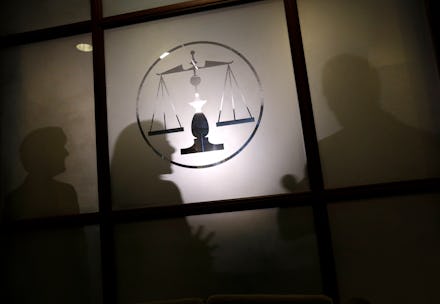The Hunter Moore Revenge Porn Website Was Totally Legal — That's the Scary Part

On Thursday, Hunter Moore, a man who deemed himself a “professional life ruiner,” was arrested. Moore rose to prominence thanks to his now-defunct website, Is Anyone Up, which was, in its time, the foremost purveyor of revenge pornography on the Internet. In theory, the site relied on jilted users to submit nude images of ex girlfriends and the occasional naked musician. Moore would then post those nonconsensual images alongside full names, Facebook profile shots, and smug reaction GIFs and memes. The victims — most of whom were women — would then be commented upon and harassed by the hate machine that was the site’s user base.
But that’s not why Moore was arrested. After all, though Moore’s business caused great distress to its victims, and impacted both their personal and professional lives, running them wasn’t a crime. Instead, he was arrested for hacking into women’s email accounts to obtain some of the nude photos on his site. If Moore had stuck to his supposed business model, Is Anyone Up would likely still be operating today.
Moore skirted repercussions for operating the site thanks to a federal law called the Communications Decency Act. Thanks to Section 230 of that act, websites are not deemed directly responsible for user-submitted content. The provision enables sites from Reddit to YouTube to Facebook to Tumblr to Instagram to exist; without it, they’d be too much of a liability to operate. However, the law also granted Moore impunity.
As such, victims of sites like Moore’s have little in the way of legal recourse. In most states, the best they can hope to do is to wage lengthy and prohibitively expensive civil suits regarding copyright or privacy, and in the process, draw more attention to the websites and photos in question. As of today, only two states have enacted legislation to deal with revenge pornography, but neither seems well equipped to deal with the issue.
New Jersey’s 2003 statute criminalizes the disclosure of nude or pornographic photos or videos without the consent of the people depicted. However, the law does nothing to address sites expressly created to display such criminal content. California’s 2013 legislation, which Forbes writer Eric Goldman referred to as “the Swiss cheese of revenge porn laws,” and which Moore responded to thusly, ignores the redistributors of revenge pornography, doesn’t apply to instances where the victim shot the photo themselves or was hacked, and requires the prosecution to prove that the defendant didn’t just cause emotional distress, but did so intentionally.
As such, though the California legislation is partially the result of one amazing mother’s crusade against Moore’s site, and though Moore lives in the state (he operated his site from his parents’ home outside of Sacramento, because of course), the law can’t be invoked in the current case against him. After all, Moore stands accused of intentionally hacking into women’s email accounts to snag nude selfies, and was presumably more interested in self-promotion, profit and running his mouth than he was in causing emotional distress.
We clearly need thoughtful and consistent legislation that provides individuals with reasonable recourse to defend their privacy, but does so without creating a chilling effect for online speech or user-submitted content.
Until then, we’ll be stuck waiting for the hubris of Moore and his ilk to catch up with them, long after they’ve damaged thousands of private individuals’ lives and profited from it.